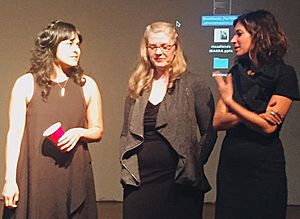Lera Boroditsky facts for kids
Quick facts for kids
Lera Boroditsky
|
|
|---|---|

Left to right: Performance artist Xandra Ibarra, cultural anthropologist Adrian Van Allen, Dr. Boroditsky in 2017
|
|
| Born | |
| Alma mater | Northwestern University (BA, 1996), Stanford University (PhD, 2001) |
| Scientific career | |
| Doctoral advisor | Gordon H. Bower |
Dr. Lera Boroditsky is a brilliant scientist who studies how language affects the way we think. She is a professor of cognitive science at the University of California, San Diego. Cognitive science is a field that looks at how our minds work, including how we learn, remember, and solve problems.
Dr. Boroditsky is well-known for her ideas about linguistic relativity. This is the idea that the language we speak can actually change how we see the world and how we think about things. She has received many awards for her important research.
Contents
Early Life and Learning
Lera Boroditsky was born in Belarus. When she was 12 years old, her family moved to the United States. There, she learned English, which was her fourth language! This experience made her wonder how different languages might make people think differently.
She went to Northwestern University and earned a degree in cognitive science in 1996. Later, she continued her studies at Stanford University. She received her Ph.D. in cognitive psychology in 2001. Her main teacher and mentor at Stanford was a famous scientist named Gordon H. Bower.
Her Career and Research
After finishing her studies, Dr. Boroditsky became a professor. She taught at the Massachusetts Institute of Technology (MIT) before joining Stanford University in 2004. Her former teacher, Gordon Bower, said it was very rare for Stanford to hire their own students back, but Dr. Boroditsky was special because she was so smart and good at solving problems.
Today, Dr. Boroditsky is a professor at the University of California, San Diego. She focuses on how language, thinking, and how we see things all connect. She uses ideas from different fields like linguistics (the study of language), psychology (the study of the mind), and anthropology (the study of human societies).
How Language Shapes Thought
Dr. Boroditsky's most famous work explores the big question: Does the language we speak change how we think? She has found many interesting examples that show how different languages can lead to different ways of thinking.
For example, she has studied how people who speak English and people who speak Russian describe cups and glasses. In English, we often decide if something is a "cup" or a "glass" based on what it's made of. But in Russian, the shape of the object is more important.
Another example is how English speakers and Mandarin speakers think about time. English speakers often imagine time moving horizontally, like walking forward. Mandarin speakers, however, often think of time moving vertically, like going up or down. Dr. Boroditsky's research suggests that while our language can influence our thoughts, it doesn't completely control them. People can learn to think in new ways, even without learning a new language.
Metaphors and Thinking
Dr. Boroditsky also studies how metaphors affect our thinking. Metaphors are when we describe one thing by saying it is like another (e.g., "time is money"). She has found that the metaphors we use can change how we understand and react to different situations.
For instance, if crime is described as a "beast," people might want to fight it with more police. But if crime is described as a "virus," people might think about solving it through social changes. This shows how the words we choose can really influence our ideas and decisions.
Publications
Dr. Boroditsky has written many important papers about her research. Here are a few examples:
- Thibodeau PH, Boroditsky L (2015) Measuring Effects of Metaphor in a Dynamic Opinion Landscape. PLoS ONE 10(7): e0133939. doi: 10.1371/journal.pone.0133939
- Thibodeau PH, Boroditsky L (2013) Natural Language Metaphors Covertly Influence Reasoning. PLoS ONE 8(1): e52961. doi: 10.1371/journal.pone.0052961
- Boroditsky, L. & Ramscar, M. (2002). The roles of body and mind in abstract thought. Psychological Science, 13(2), 185–188.
- Boroditsky, L. (2001). Does language shape thought? Mandarin and English speakers' conceptions of time. Cognitive Psychology, 43(1), 1–22.
- Boroditsky, L. (2000). Metaphoric Structuring: Understanding time through spatial metaphors. Cognition, 75(1), 1–28.
See also
 In Spanish: Lera Boroditsky para niños
In Spanish: Lera Boroditsky para niños
 | Jewel Prestage |
 | Ella Baker |
 | Fannie Lou Hamer |

